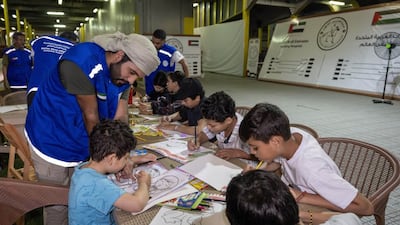Staff at the UAE's floating hospital docked at the city of Al Arish in northern Egypt organised a day of fun activities for the children of Gaza on Friday.
It was aimed at improving their psychological and social well-being using arts and entertainment, while creating a safe space for the children to express themselves, state news agency Wam reported.
Mona Talib Ahmed, a nurse at the hospital, said competitions – based around drawing, henna and the Quran – helped “ease their distress”, amid the Israeli strikes and ground offensive in the Palestinian enclave.
Hospital staff host weekly events to keep the children entertained, she said.
The 100-bed floating hospital was set up as part of the UAE's Gallant Knight 3 campaign, to provide a lifeline to the people of Gaza.
The ship, which sailed from Khalifa Port in Abu Dhabi, is fitted with operating theatres, intensive care units, radiology facilities, a laboratory, a pharmacy and medical warehouses.
It also has an evacuation aircraft and boat, together with fully equipped ambulances to transport patients.
According to the UN children's fund, the levels of stress and pressure found in children in Gaza is higher than seen in most other conflicts.
Adele Khodr, Unicef Middle East and North Africa regional director, wrote in The National this year that “the intensity and the frequency of what we have seen in Gaza in terms of the mental stress on children and the psychological pressure is something we have rarely seen”.
“There is nowhere safe in Gaza,” she said.
Many children in Gaza have been forced to keep moving to avoid bombing. They “remain sort of stuck in a constant cycle of being exposed to violence and fear”.
The war has also impacted the education of thousands of children, with a group of UN experts calling the crisis “scholasticide”. The systematic destruction of educational facilities in the strip, means that “at least 625,000 students have no access to education”, said the experts.
UAE aid drops into Gaza – in pictures
Switching%20sides
%3Cp%3EMahika%20Gaur%20is%20the%20latest%20Dubai-raised%20athlete%20to%20attain%20top%20honours%20with%20another%20country.%0D%3C%2Fp%3E%0A%3Cp%3E%3Cstrong%3EVelimir%20Stjepanovic%20(Serbia%2C%20swimming)%20%3C%2Fstrong%3E%0D%3Cbr%3EBorn%20in%20Abu%20Dhabi%20and%20raised%20in%20Dubai%2C%20he%20finished%20sixth%20in%20the%20final%20of%20the%202012%20Olympic%20Games%20in%20London%20in%20the%20200m%20butterfly%20final.%20%0D%3C%2Fp%3E%0A%3Cp%3E%3Cstrong%3EJonny%20Macdonald%20(Scotland%2C%20rugby%20union)%20%3C%2Fstrong%3E%0D%3Cbr%3EBrought%20up%20in%20Abu%20Dhabi%20and%20represented%20the%20region%20in%20international%20rugby.%20When%20the%20Arabian%20Gulf%20team%20was%20broken%20up%20into%20its%20constituent%20nations%2C%20he%20opted%20to%20play%20for%20Scotland%20instead%2C%20and%20went%20to%20the%20Hong%20Kong%20Sevens.%20%0D%3C%2Fp%3E%0A%3Cp%3E%3Cstrong%3ESophie%20Shams%20(England%2C%20rugby%20union)%20%3C%2Fstrong%3E%0D%3Cbr%3EThe%20daughter%20of%20an%20English%20mother%20and%20Emirati%20father%2C%20Shams%20excelled%20at%20rugby%20in%20Dubai%2C%20then%20after%20attending%20university%20in%20the%20UK%20played%20for%20England%20at%20sevens.%20%0D%3C%2Fp%3E%0A
Benefits of first-time home buyers' scheme
- Priority access to new homes from participating developers
- Discounts on sales price of off-plan units
- Flexible payment plans from developers
- Mortgages with better interest rates, faster approval times and reduced fees
- DLD registration fee can be paid through banks or credit cards at zero interest rates
PSL FINAL
Multan Sultans v Peshawar Zalmi
8pm, Thursday
Zayed Cricket Stadium, Abu Dhabi
Our legal consultant
Name: Hassan Mohsen Elhais
Position: legal consultant with Al Rowaad Advocates and Legal Consultants
More from our Neighbourhood series:
EMILY%20IN%20PARIS%3A%20SEASON%203
%3Cp%3ECreated%20by%3A%20Darren%20Star%3C%2Fp%3E%0A%3Cp%3EStarring%3A%20Lily%20Collins%2C%20Philippine%20Leroy-Beaulieu%2C%20Ashley%20Park%3C%2Fp%3E%0A%3Cp%3ERating%3A%202.75%2F5%3C%2Fp%3E%0A
Mohammed bin Zayed Majlis
Specs
Engine: 51.5kW electric motor
Range: 400km
Power: 134bhp
Torque: 175Nm
Price: From Dh98,800
Available: Now
Specs
Engine: Duel electric motors
Power: 659hp
Torque: 1075Nm
On sale: Available for pre-order now
Price: On request
Biog
Mr Kandhari is legally authorised to conduct marriages in the gurdwara
He has officiated weddings of Sikhs and people of different faiths from Malaysia, Sri Lanka, Russia, the US and Canada
Father of two sons, grandfather of six
Plays golf once a week
Enjoys trying new holiday destinations with his wife and family
Walks for an hour every morning
Completed a Bachelor of Commerce degree in Loyola College, Chennai, India
2019 is a milestone because he completes 50 years in business
Jetour T1 specs
Engine: 2-litre turbocharged
Power: 254hp
Torque: 390Nm
Price: From Dh126,000
Available: Now
Director: Laxman Utekar
Cast: Vicky Kaushal, Akshaye Khanna, Diana Penty, Vineet Kumar Singh, Rashmika Mandanna
Rating: 1/5








